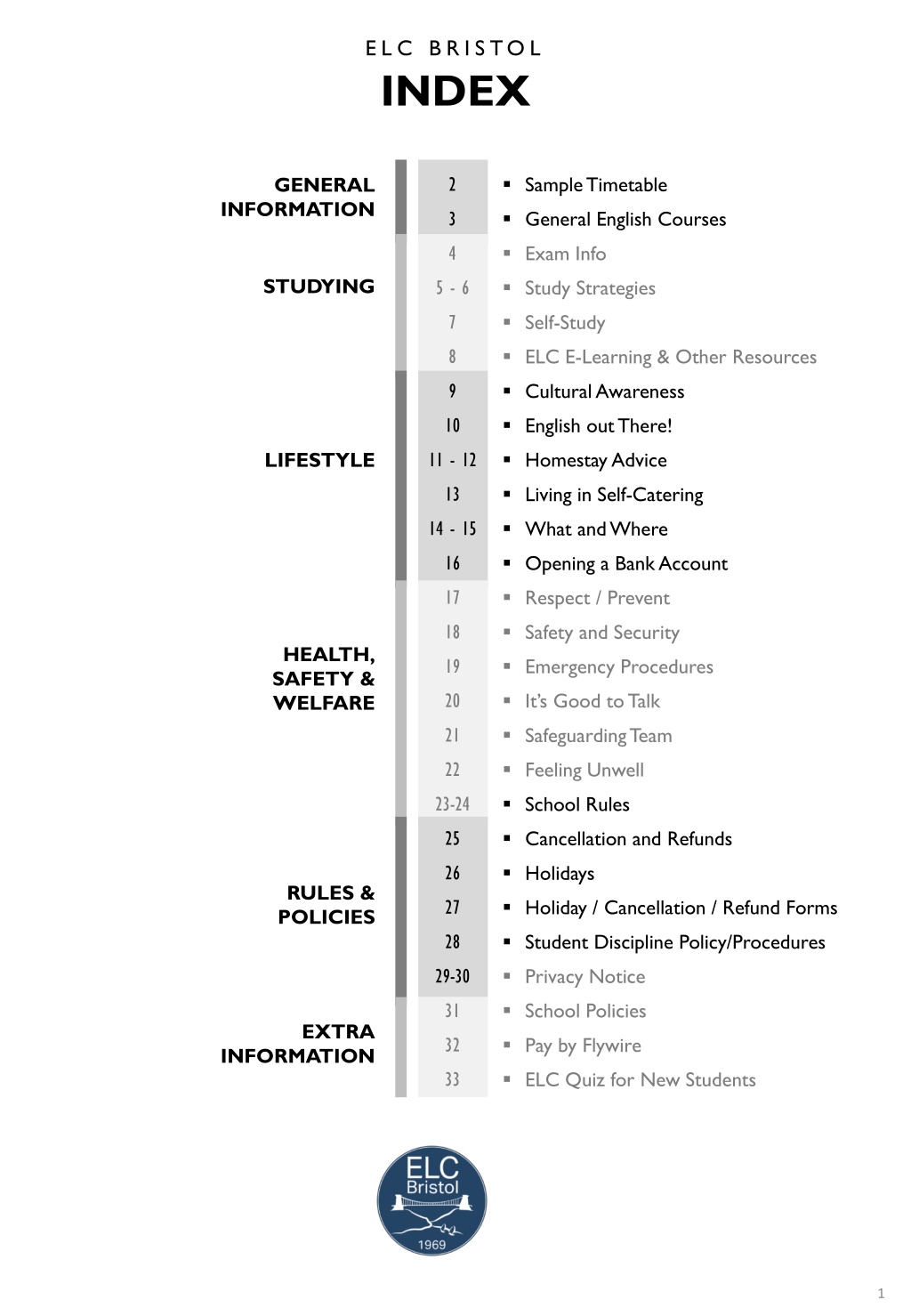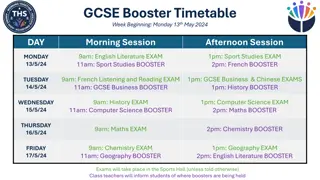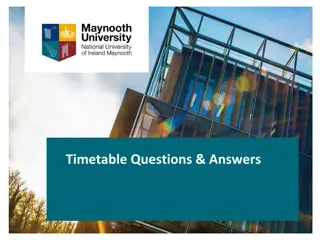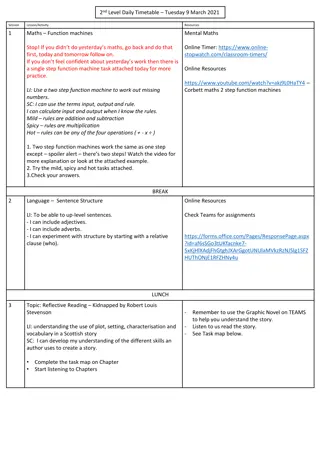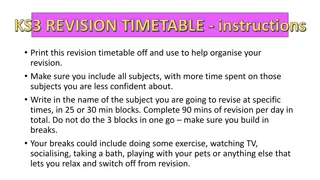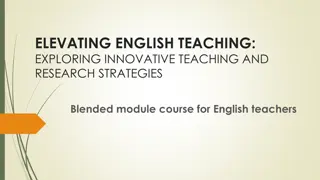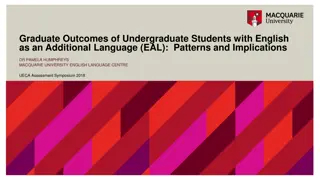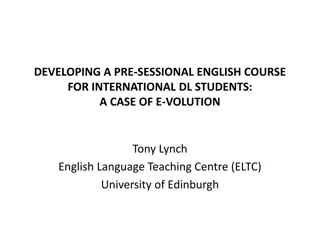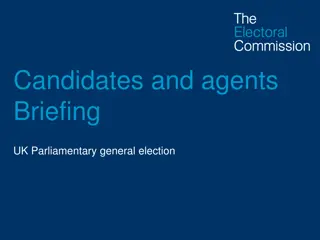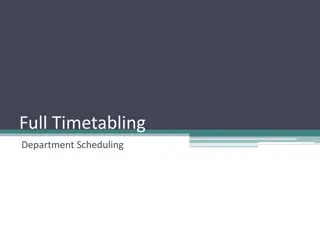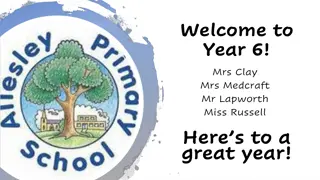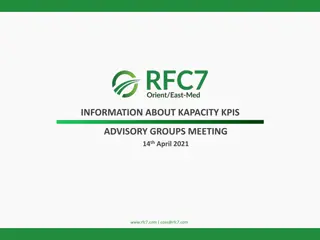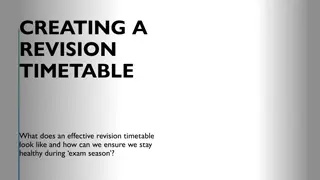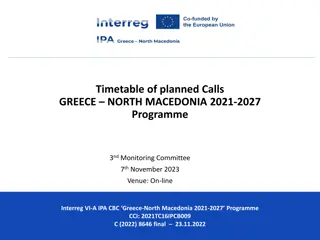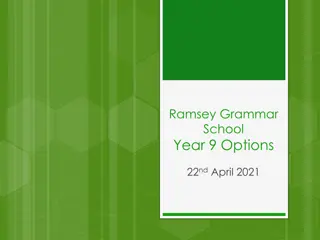English Language Course Information and Study Timetable
Gain insight into a comprehensive English language course at E.L.C. Bristol through a detailed study timetable covering grammar, vocabulary, speaking, listening, reading, and writing skills. Explore the general information about course structure, syllabus, assessment, and study strategies provided in a supportive environment. Engage in various activities and resources to enhance language proficiency and cultural awareness, along with lifestyle and health tips for a holistic learning experience.
Download Presentation

Please find below an Image/Link to download the presentation.
The content on the website is provided AS IS for your information and personal use only. It may not be sold, licensed, or shared on other websites without obtaining consent from the author. Download presentation by click this link. If you encounter any issues during the download, it is possible that the publisher has removed the file from their server.
E N D
Presentation Transcript
E L C B R I S TO L INDEX 2 3 4 Sample Timetable GENERAL INFORMATION General English Courses Exam Info STUDYING 5 - 6 7 8 9 10 11 - 12 13 14 - 15 16 17 18 19 20 21 22 23-24 25 26 27 28 29-30 31 32 33 Study Strategies Self-Study ELC E-Learning & Other Resources Cultural Awareness English out There! Homestay Advice LIFESTYLE Living in Self-Catering What and Where Opening a Bank Account Respect / Prevent Safety and Security HEALTH, SAFETY & WELFARE Emergency Procedures It s Good to Talk Safeguarding Team Feeling Unwell School Rules Cancellation and Refunds Holidays RULES & POLICIES Holiday / Cancellation / Refund Forms Student Discipline Policy/Procedures Privacy Notice School Policies EXTRA Pay by Flywire INFORMATION ELC Quiz for New Students 1
G E N E R A L I N F O R M AT I O N A SAMPLE TIMETABLE MORNINGS 09.15 10.45: Grammar/ Vocabulary/ Pronunciation/ Writing/ Listening Practice 11.15 12.45: Reading/ Vocabulary Building/ Writing *Speaking is integrated into all lessons MONDAY & WEDNESDAY AFTERNOONS 14.00 15.30: Writing Skills/ Language Consolidation/ Vocabulary Exam Preparation TUESDAY & THURSDAY AFTERNOONS 14.00 15.30: Conversation & Communication Skills for lower Levels 14.00 15.30: Various subjects for higher Levels (upper-intermediate(B2) and above) depending on what your class is interested in, including: Conversation Business English English through Music and Song Film Studies British Life and Culture English Literature Academic English English through Sport AFTER CLASS: OPTIONAL 15.45 17.20 : Optional Self Study (Supervised 15.45 - 17.00 Monday - Thursday) 16.00 17.00: Conversation Club on Wednesdays *Self-Study Centre closes at 16.50 on Fridays 2
G E N E R A L I N F O R M AT I O N GENERAL ENGLISH COURSES The course book that you will be given during your first week forms the basis of the syllabus, but is supplemented with a wide range of other materials to provide a balanced curriculum and take into account the needs and requests of students. Generally speaking, classes work through one unit of the course book a week, which is complemented by other activities and exercises in keeping with the themes, grammar and vocabulary of the week. Students are often asked to work in pairsor small groups in order to increase their classroom talking time and short communication activities are sometimes used by the teachers to add variety and fun. The year is divided into 4 main periods, the summer courses (14 weeks) and 3 other terms which last between 10 and 14 weeks. By the end of each of these periods a course book will have been completed. The teachers have a clear idea of the syllabus they will be following as they normally choose the course book that they will be using themselves. Every week your Lesson 1 teacher makes a programme for your class, which is structured to offer a balanced programme covering grammar, vocabulary, pronunciation, and work on the 4 skills of speaking, listening, reading and writing. It is designed to be flexible, and is influenced by discussion with students in the regular Friday interviews and the other teachers of the class. Teachers put up a weekly plan of work on the classroom wall to keep their students informed of what they will be studying each week and to provide an overview of what the class has already studied for any new students arriving. ASSESSMENT Teachers are constantly assessing their students; during class work, when they check their homework and following the regular tests. Feedback about a student s strengths, weaknesses and progress is given to them during their Friday interviews, which take place at the end of their first week in the school and every 2 - 3 weeks after that. What do I do if I think I m in the wrong level? First, if a teacher thinks that a student should move up or down a level, he/she will discuss it with the other class teacher(s) and the student themselves before a decision is made. If you think you are in the wrong level, talk to your teacher. If a student asks to move up a level before the end of term and the teacher is not sure whether they are able to cope at a higher level, he/she will discuss it with the Director of Studies and arrange for them to do a special test to help them to make a final decision. This is also the case if the student and teacher disagree about whether the student should move up. If students have weak communication skills, but a strong foundation in grammar, their skills will be monitored over a suitable period to see if they have reached the right level. When students are staying longer than one term, they are interviewed by their teacher during the last week of the term. The aim of the discussion is for the teacher and student to agree which level the student should study at on the following course. The teacher knows the student s level the best, but if there is any disagreement, the studentwill be asked to take the alternative entry test. Students normally do class tests every 1-3 weeks and are given a written progress report a couple of weeks before they leave the school and at the end of their first full term if they are long stay students. 3
G E N E R A L I N F O R M AT I O N EXAM INFO EXAMINATIONS We prepare students for IELTS (Academic), Cambridge First Certificate, Advanced and Proficiency exams. CAMBRIDGE Cambridge English First (FCE) for Upper-Intermediate Level students (B2) Cambridge English Advanced (CAE) for Advanced Level students (C1) Cambridge English Proficiency (CPE) for Proficiency Level students (C2) Candidates for FCE, CAE and CPE use an exam preparation course book at the appropriate level. IELTS (Academic) This full-time course is available to students who are B2 (upper-intermediate) level or above. We stress to students that good skills in English and a sound knowledge of grammar are essential for success in the exam. Students take their exams at various times and stay in the class for varying lengths of time, which means that the skills tested in the exam must be covered in a cyclical fashion. The exam is held in Bristol once or twice a month. Some students may need a UKVI IELTS exam, this is held in Cardiff or London. CAMBRIDGE COURSES AT ELC BRISTOL ELC Bristol has a long, successful history of preparing students for the Cambridge exams. Please read the following so you know what to expect. At the start of your course, students are given a Cambridge exam course book, which forms the basis for their studies and covers the Cambridge syllabus. The average class size is 10. The maximum is 14. Cambridge classes are not closed so students can join for periods shorter than 11/12 weeks. Most, but not all class members, are exam candidates. A few of our long-term General English students also ask to join exam classes. We do not believe in just practising with past papers; when students start the course, we familiarise them with the exam and then, as with the General English courses, we focus on the 4 skills of reading, writing, listening and speaking. This way we help students reach the level of English required to pass the exams. Exam practice is given throughout the course, but especially in the weeks leading up to the exam. A mock exam takes place 2 weeks before the exam date. Course fees for Cambridge courses and General English courses are the same. The exam is taken at the local exam centre in Bristol. The exam fee is payable direct to the exam centre. Students must book the exam themselves, directly with the exam centre. 4
S T U DY I N G STUDY STRATEGIES Here are some tips which will help you study English more effectively. YOUR ELC FOLDER 1. It is a good idea to organise your file so that you can find any materials quickly and easily. You can organise it under the headings below or, if you prefer, into Lesson 1, 2 & 3. VOCABULARY EXAMPLE: 1. Write down any new words, phrases or expressions you learn inside or outside the classroom. VERB NOUN comfort comfort 2. You may want to keep a vocabularybook . When you write down new words, try writing down the wordfamily as well as the pronunciation. ADJECTIVE ADVERB (un)comfortable (un)comfortably 3. Choose 6 or 7 new words or phrases each day that you think are important. Write them in sentences and then try to use them when speaking to people that day. SPEAKING 1. Don t worry about making mistakes when you are speaking. You can think about what you said later and then try to improve it the next time. 2. Use the new grammar and vocabulary you learn in the class outside the class. 3. Take advantage of any speaking situations the teacher gives you. 4. Take every opportunity you can to speak English. 5. Remember, speak English all the time in school. READING 1. Read as much as you can and as widely as you can. 2. Concentrate on the general meaning of the text. Don t worry if you do not understand every word. 3. Try to use the context surrounding the word to help you guess what unknown words might mean. Think about whether the word(s) you don t know are nouns, adjectives etc. 4. Don t stop reading to find a word you don t know in the dictionary. Use the context to guess the word. Continue reading to get the general idea of the text. You can then go back and read the text again more carefully later with a dictionary. 5
S T U DY I N G STUDY STRATEGIES WRITING 1. Writing will help you develop not only writing skills but also vocabulary and grammar. Consider keeping a diary and writing a little bit each day. Use new grammar or vocabulary you have learnt in the class in your writing. This will help you remember it more easily. 2. When your teacher corrects a piece of your writing, it is a good idea to write it again and keep it in your file. From time to time read over your old writings. 3. Your teacher will often correct a piece of writing by using the symbols below so that you can correct your own work. This will help you to think about the kind of mistakes you make. Gr: grammar T: tense ^ : add a word Sp: spelling The: not necessary WO: wrong order P: punctuation Ww: wrong word prep: preposition R: register (the word or phrase is not right for this kind of writing too formal/informal) LISTENING 1. Listen to radio programmes, the TV, You Tube etc. 2. Concentrate on the general meaning. Don t worry if you don t understand every word. 3. If you are using the MMC, look at the podcasts in the self access materials. 4. Listen first for the general meaning and then repeat it to get more specific details. 5. If you re watching films in English, use English subtitles, not subtitles in your language. PRONUNCIATION 1. When practising pronunciation, it is important to listen to yourself and then repeat the exercise you are doing. Try to get better each time. 2. Repeat the exercise until you are happy. 3. Remember, don t just practise individual sounds but also weak forms, intonation, word and sentence stress etc. If you have any questions about any of the above, or if you need more advice, just ask your teacher or the Director of Studies. 6
S T U DY I N G SELF-STUDY MULTIMEDIA CENTRES The Multimedia Centre (MMC) is a study room with 12 students computers, 1 teacher s computer and other resources where you can have class activities or study by yourself. When: 8.45 - 9.15 /10.45 - 11.15 /12:45 - 14.00 /15:30 - 17:20 (16.50 on Fridays) Help: There is a teacher on hand to help you between 3.45 - 4.45 Monday Thursday. Private Study: you can also use free classrooms to study in from 15.30 - 17.20. To use the MMC (room 007) computers: Username = your elc student number Password = English1969! IMPORTANT RULES Do not use laptops in the MMC. Put back all materials in the correct place. Do not eat or drink in the MMC. Do not chat loudly as it is a study area. SELF-STUDY MATERIALS There is a wide range of Cambridge and IELTS exam practice materials as well as exercises to practise listening and pronunciation. In addition, there are grammar and vocabulary books, and books on specialist subjects. Students can use the multimedia centre to access Guided e- learning and the Study Zone. GEL log in: Username = your elc student number; Password = your elc student number You can borrow:novels, graded readers and DVDs. Do not forget these must be signed out. All the other materials in the centre cannot be taken home. WI-FI If you prefer to use your own laptop or phone to study, there Is free Wi-Fi access. See the noticeboards for the password or ask in the office. LIBRARY/BOOKS Every class has a small classroom library with graded readers specifically chosen for the level of the students in that class. The books can be signed out in the classroom. You can also borrow books from the Multimedia Centre and, if you wish, you can become a member of Bristol City Library (next to the Cathedral in the centre). 7
S T U DY I N G ELC E-LEARNING & OTHER RESOURCES www.elcbristol.co.uk/study-zone/ WHY USE ELC E-LEARNING? It is an excellent way to improve your English, working at your own pace and level, on whichever device suits you, including your mobile phone. You choose which skills to work on and practise as little or as much as you like. It s a great way to prepare for your course in Bristol, supplement your studies while you re here and even continue your progress after you ve left us. WHEN CAN I USE IT? You can start using it from the moment you enrol until 3 months after your course finishes. WHAT MATERIALS ARE ON THE STUDY PAGE? Skills Work: find listening difficult? Want to improve your reading speed? Focus on your weaknesses and work to get better. Grammar Practice: choose a grammar point from the list, read clear explanations and try a variety of practice exercises. Study Plan: here you get to work on a variety of different skills. It adapts to your level: if it s too easy, the exercises get more difficult, but if you re struggling, they get easier. Exam Practice: planning on taking IELTS or a Cambridge exam in the future? Work on the skills you ll need here. Flash Point: each week you get a 45-minute lesson based on a newspaper article. Each lesson has vocabulary and comprehension questions. You can also access all the previous lessons. Apart from the Study page, you can do extra work on the Progress page. This work is directed to you by the programme in response to work you ve already done. It contains lessons that e- learning recommends based on your previous performance or topics in which you have shown an interest. Teachers may also assign e-learning homework here. Username = your elc student number Password = your elc student number OTHER RESOURCES Available on the school website, by using the Search option on the home page or looking in Study Zone you can find: Road to Ielts - Ielts exam practice and skills development General grammar, vocabulary, listening, pronunciation and writing materials Links to newspapers and magazines and business and work English websites DICTIONARIES Each classroom has 6 English to English dictionaries for students to use. APPLE TVs & IPADS Teachers can use Apple TV and iPads to show Internet content such as YouTube and BBC iPlayer and other digital teaching materials on the flat screen TVs in each classroom 8
L I F E S T Y L E CULTURAL AWARENESS Here is some information to help you adapt to life in Britain. DO IT THE BRITISH WAY: Meeting new people: Leave some space between yourself and the other person while you re talking. Maintain eye contact, but do not stare. When someone asks, How are you? ,after you say, Fine, thanks ,it s polite to ask Andyou? Going to someone s house: If you are invited to someone s house for dinner, arrive a little later than stated (5-10 minutes). Sometimes the invitation will say, for example, 7.30 for 8. This means that you will start eating at 8 and so you should arrive anytime between 7.30 and 8. It is also a good idea to take a small gift, such as a bottle of wine or chocolates. British people often open presents immediately. If you are invited to a party you can arrive up to an hour after the time stated. You should take something for people to drink. If you are invited to a formal meeting, arrive at least 5 minutes before the time stated. If you visit someone s house, you will not need to take off your shoes when going in but this depends on the family. If you are not sure, then just ask. Going out: When buying things or asking for things, it is important to be polite. You should always say Excuse me , when starting the conversation. You should also say Could/Can I have ..please . Remember always to say Thank you when you receive something. In pubs, cafes and clubs it is normal to pay for your drinks when you order them. Pubs normally close at 11pm, clubs between 2 and 4am. If you go to a pub or caf , it s expected of you to buy at least one drink. It s normal to tip about 10% in a restaurant (if you are happy with the service) and the service is not already included in the bill, but not when buying takeaway food. You don t need to give a taxi driver a tip but some people give them about 1 or tell them to keep the change. 9
L I F E S T Y L E ENGLISH OUT THERE EXPERIENCING BRITISH CULTURE: Studying English in England has one major advantage - you are exposed to the language 24 hours a day and this certainly helps you learn it more quickly. If you want to maximise your exposure to native speakers and immerse yourself in English culture you need to make a plan. What can you do? If you are staying with an English family, try to join in as much as possible. It s amazing how much conversation comes up if, rather than staying in your room, you offer to help around the house! You don t have to, but why not ask if you can help with the shopping or even the washing up! The friendlier you are with the family, the more they will open up to you and the more you can practise your English. Bristol is an exciting city with lots going on. Keep an eye on the Bristol monthly magazine and Bristol Visitor guide to see what events are happening locally. You can join one of the very many and varied university sports clubs or societies. This is a unique advantage for students at ELC and a great way to make English friends. Available from September to May. There s a huge variety of interesting local clubs for you to join. Popular clubs include running, football, zumba, ballet, salsa and hip-hop clubs. Even if you just go along to the gym and swimming pool in Clifton College, you are bound to meet up with local people. Local churches: St Peter and Paul s Catholic Cathedral and All Saints Church of England Church are both close by on Pembroke Road, the local Mosque is in the University Students Union building and the Synagogue on Park Row all encourage our students to attend and join in with social events. See the hall notice board for your contact information and if you are interested, just go along. BISC (Bristol International Student Centre). The University Christian society arranges weekly excursions, activities and many events where you will have the chance to meet local people. For more information, speak to the Social Programme Organiser. Lots of the social programme activities include listening to and interacting with native speakers. For example, theatre visits, guest speakers, pub quizzes, salsa classes and wine tasting. Sign up for activities in the office and enjoy yourself. Out of classroom activities: Local surveys, photo trails and more are arranged by your teacher. Working in the UK The only international students who are allowed to work in the UK are those who have a Tier 5 Youth Mobility Visa. These are typically students between 18 and 30 who come from Japan, South Korea, Hong Kong and Taiwan. When there is demand, we run an ELC Job Club during which we help students prepare their CVs. We also advise them how to get a National Insurance Number which they will need before they can start to work. You can look for more information on our website (elcbristol.co.uk), where you can also find contact details of many of the places where our students have worked in the past and other key details about working in England. THE MAIN THING IS TO REMEMBER TO SPEAK ENGLISH ALL THE TIME During break time, at lunch time and after school. Don t fall into the trap of speaking your own language and just mixing with students from your own country. You can do this when you go home! 10
L I F E S T Y L E HOMESTAY ADVICE Accommodation is so important and we want you to be happy. We visit and are in regular contact with all our accommodation providers. They are all quite different: some of you may live with a family, others with a lady on her own; some may live in flats 5 minutes walk from school, others in houses 30 minutes away; some of you will be the only student in the house, others may live with other students from the school. One thing they have in common is that students who have stayed there in the past have been happy and have recommended the accommodation. Homes and customs are different all over the world. Try to be flexible. When you don t know what to do, ask! Remember the accommodation is not a hotel. Do not expect everything to be done for you. Try to help if you can, as if you were at home. The most important thing is that you are happy. Here are some guidelines to help you feel at home: YOUR ROOM: you should have a bed, desk, lighting and somewhere to hang and put your clothes. If something is missing, ask! In winter, central heating is provided but not overnight. If you are cold, ask for extra blankets. Your landlady will clean your room, but please keep it tidy and make your own bed. BATHROOM: Ask your homestay when it is convenient for you to have a bath or shower. Leave the bathroom clean and tidy and be careful not to get water on the floor. Sometimes the hot water supply may be limited so try not to spend too long in the shower. FOOD AND MEALTIMES: In England, breakfast is usually a helpyourself affair. In the evening you will eat with the family. If there is anything you cannot eat, please tell your homestay. Please be at home in time for meals. If you do not require a meal or if you need to eat early, it is important that you tell your homestay in advance. During the week and at weekends lunch is not provided, so you will have to make your own arrangements. WASHING: The arrangements vary. Normally your homestay will wash one load of clothes once a week. Ask which day you should put your washing out. Sometimes, the homestay will ask you to use the washing machine yourself. Students do their own ironing and also their own hand washing. Ask where you should do this. The important thing to remember is to always ask! MONEY/VALUABLES: Don t leave valuables lying around. It is a good idea to lock things up in your case. Alternatively, you can ask your homestay where the best place is to put things. If you have cash, open a bank account. We will help you do this TELEPHONE: It is best not to use the house phone to make outgoing calls except, of course, in emergencies. Most families do not mind receiving calls, provided they are not too long, too often, and not after 10.00 p.m.! If you need to use the phone on a regular basis, we suggest you get a mobile. 11
L I F E S T Y L E HOMESTAY ADVICE VISITORS: If you wish to invite your friends round in the evening, please ask your homestay first. Also, if you have family or friends visiting you while you are here, please don t ask your homestay to let them stay. Ask in the office for a list of convenient hotels and bed and breakfast accommodation. STAYING OUT LATE: If you are staying out late, tell your homestay. Security is important, so remember to lock the door when you come home and be quiet! If you decide to stay out all night, you must let the family know. STUDENTS UNDER THE AGE OF 18 STAYING OUT LATE: You have to be back in your homestay by 23:00 from Sunday to Thursday and by 24:00 on Friday and Saturday. If you are not, your homestay will call the Principal and he will come out to find you and will also inform your parents. If there is an emergency and you are going to be late, make sure you call the homestay immediately. HOLIDAYS: If you wish to go on holiday and it has been approved by the school, provided you give two weeks notice and provided you are away for a full week, you will be refunded half the accommodation cost. CHANGING ACCOMMODATION: If, for whatever reason, you wish to change your accommodation, please remember that changes happen at weekends and that you have to give one week s notice within the first 4 weeks of your stay and two weeks notice after that. If you do not give the appropriate notice, you will have to pay for the notice period. We want you to be happy. If you have a problem, talk to your homestay first. It is surprising how many things are just misunderstandings! Remember, we are also here to help, so you can come and talk to us at any time if there is anything you do not understand or feel unhappy about. 12
L I F E S T Y L E LIVING IN SELF CATERING ELC Bristol offers self-catering accommodation in student houses with individual study-bedrooms and shared facilities. Our largest student residence is St. John s house, which has 28 student study-bedrooms and 2 onsite Residential Managers. Our other residences vary in size, accommodating up to 7 students in a single residence. In July and August we also use the summer residential accommodation, where we have up to 80 single study-bedrooms, and there are a variety of shared facilities. Self-catering accommodation varies: Cooking facilities: You might have your own, or you might share these with a family or with other students. The entrance: The accommodation may be independent, with your own entrance, or this could be shared. Your room: This could be the top floor, or the basement, of a family house or a student residence. In all types of self-catering accommodation you can expect the following: (unless otherwise specified in the letter we send you) BEDDING AND COOKING UTENSILS: Are provided unless otherwise advised. You should bring your own toiletries and towels. UTILITIES: The rent includes electricity and gas but not a telephone line. All houses have Internet access. CLEANING: You are expected to keep the accommodation clean and tidy yourself. If your accommodation is independent, you will have to supply your own cleaning materials. WASHING: All of our self-catering properties have washing machines for you to use. TELEVISION: If there is a television, we will confirm this in the letter we send you. VISITORS/GUESTS: Make sure you understand the house rules/guidelines regarding visitors and guests. Don t assume that you can have parties or that your friends can stay. HOLIDAYS: With self-catering arrangements, if you go away on holiday, you are not entitled to a refund. However, during the winter holiday when the school is closed, if you want to keep your room and you go away for at least 7 nights (weekend to weekend), you ll only pay 50% of the self-catering rate. CANCELLING/LEAVING: If you want to cancel or leave your accommodation, you must give the school 2 full weeks notice, except during the first 4 weeks of your stay when one week s notice is sufficient. If you are in self-catering accommodation in a family home, don t expect too much contact with the family. They, and you, have probably chosen a self-catering arrangement so that you can both be independent. 13
L I F E S T Y L E WHAT & WHERE SHOPPING AREAS SPORTS CENTRES Small shops shut at 5.30pm. Shopping Centres have later opening hours. Clifton College gym and pool One time payment of 10. Broadmead & Cabot Circus Clifton College - tennis courts available (July and August only) The Mall at Cribbs Causeway - huge out-of-town undercover shopping complex. Nuffield Sports Centre - Queens Road, smart but quite expensive St Nicolas Market - Corn Street, traditional undercover market Pure Gym Harbourside Really good price and no minimum contract Whiteladies Road and Park Street - nice selection of shops. Ashton Court Park - golf course The Arcade Boyce s Avenue in Clifton Village, arts & crafts shops Redland Tennis Club Great Western Runners - Running with GWR on Wednesday evenings. Meet at Redland Tennis Club at 6.30pm Supermarkets Sainsbury s, Co-Op , Tesco Express and Marks&Spencers on Whiteladies Road CHEMISTS POST OFFICES Boots - Clifton Down Shopping Centre Cotham Hill Post Office Cotham Hill Chemist (in the Post Office) Tesco Express Post Office Whiteladies Road BANKS Open 9.30 16.30 BIKES SHOP & HIRE HSBC, Santander & Halifax - Whiteladies Road Blackboy Cycles - top of Whiteladies Road. Bike hire from 15 per day, used bikes from 70.00, new ones from 100. Why not buy one and sell it to another student when you leave? Cash Point machines (ATM) - Whiteladies Road. STATIONERY SHOPS WHSmith - Clifton Down Shopping Centre TRAVEL & FOREIGN CURRENCY MUSIC VENUES Flight Centre - by Clifton Down Shopping Centre. Arranges flights & help with Schengen visas The Old Duke Post Offices - currency exchange Mr Wolfs Marks & Spencer - Broadmead. Currency exchange Louisiana STA Travel - Queens Road, on the corner of the Triangle. Cheap student travel +ISIC cards available The Hippodrome The Bristol Beacon O2 Academy - see Venue websites for details PUBS Thekla Steam DANCE CENTRES Alma Tavern Channings Bristol School of Dancing Alterego Bristol Community Dance Centre 14
L I F E S T Y L E WHAT & WHERE CINEMAS & THEATRES PLACES TO VISIT Visit: www.visitbristol.co.uk Everyman Bristol Whiteladies Road Clifton Suspension Bridge Vue - Cribbs Causeway near the Mall The Docks and SS Great Britain Odeon - Union Street, City Centre M Shed Museum - free entry Orpheus Henleaze City Museum - free entry Arnolfini/Watershed - Harbourside arthouse/world cinemas Blue Reef Aquarium Cinema de Lux - Cabot Circus Theatre Royal/Old Vic - King Street Hippodrome - City Centre NIGHT CLUBS Alma Vale Tavern - Pub Theatre Bristol is a relatively safe city, but you must take care in the city centre late at night, especially at weekends. Never leave your drinks unattended and never leave a club without all your friends. Tobacco Factory Bedminster Redgrave Theatre - Clifton College PARK STREET: Elbow Room / The Woods / Java / OMG CLIFTON: Mbargo / La Rocca / Lizard Lounge PLACES TO EAT Student favourites: based on a student survey from 2023 Clifton Thai Starbucks Sainsbury's (Supermarket) Bosco Pizzeria Rubicon Too (Caf ) Costa Coffee Dragon Fountain (Chinese) Tops Pizza Hubbox (Burgers) 10. Subway 11. Boston Tea Party (Cafe) 12. Chopsticks (Chinese) 13. W.G. Grace (Pub) 14. Sandwich Sandwich 15. Achari Indian Kitchen 16. Bakesmiths 1. 2. 3. 4. 5. 6. 7. 8. 9. Scan the QR Code below to open What & Where What & Where on Google Maps 15
L I F E S T Y L E OPENING A BANK ACCOUNT WHY OPEN AN ENGLISH BANK ACCOUNT? If you are only in the UK for a short while, it may not be necessary to open an account as you can usually use your debit card (from your own country) to withdraw cash from ATM machines. You should ask for the withdrawal to be calculated in GB Pounds rather than in your own currency as you usually get a better rate. If you open a bank account here: You can transfer money to this account from abroad You can get cash from ATM machines. Avoids keeping large amounts of cash. If you are enrolled on a course for more than 6 months, you will get a card which you can use to pay for things in shops. The main banks in the UK are : HSBC Barclays Lloyds Royal Bank of Scotland Monzo WHICH BANK IS BEST FOR YOU? This is difficult to say because they all offer more or less the same service. All UK banks will offer you a VISA debit card which you can use to get cash from ATM machines. If you are staying for more than 6 months, they should offer you a full bank card and a cheque book. TO OPEN AN ACCOUNT: 1. Go to the school office and ask for a Bank letter. You will be asked to fill in a form stating a few details, including which bank you want to join, your current address and address in your home country. 2. Take this letter, along with your passport, to the following bank. 3. The school is only able to issue you with a bank letter if we have arranged your accommodation. If you have arranged your own accommodation then you will need a certificate of registration from us and also a document from your landlord/landlady confirming your address. 16
H E A LT H , S A F E T Y & W E L FA R E RESPECT + PREVENT RESPECT ELC has staff and students of many different ages and nationalities and from many different backgrounds. The mix of people and cultures is what makes the school such an interesting and exciting place in which to work and study. Help us to keep ELC Bristol a happy place for all staff and students by remembering the following guidelines: Respect other students, staff and visitors, whatever their race, gender, age, sexuality, appearance or dress, disability, economic background, political opinion or religion. No discrimination of any sort. No bullying or sexual harassment. Speak English at all times. This way, people from other countries can understand you and join your conversation. Mix with people from different backgrounds and from different countries (not just your own country!). Learn new things about the world and about British life and culture. English is a polite language. Use please , thank you , and sorry to show your respect for other people. Think carefully about other people s feelings before you speak or act. What may be acceptable in your country might upset someone from a different culture. For example, you should not be overly physical in public. Teachers and other students may have questions about your culture, religion or background. Help them to learn more about you by sharing your beliefs and ideas, but respect that theirs may be different to yours. Remember that we are all different and this is what makes ELC Bristol such an interesting place! If you hear or see anything that you think is unpleasant, rude or unfair please tell your teacher or talk to the Academic Director (mark@elcbristol.co.uk), the Director of Studies (pete@elcbristol.co.uk), the Director (john@elcbristol.co.uk) or the Principal (andrew@elcbristol.co.uk) PREVENT ELC Bristol recognises its responsibilities under the Counter Terrorism & Security Act 2015 to help prevent people of all ages from being radicalized or drawn into terrorism. We believe in: Tolerance Mutual Respect Democracy Individual Freedom Respect for the law If you believe that someone has extreme political, social or religious ideals, please tell your teacher or talk to the Academic Director or email the Director john@elcbristol.co.uk or the Principal andrew@elcbristol.co.uk 17
H E A LT H , S A F E T Y & W E L FA R E SAFETY & SECURITY ROAD SAFETY In England we drive on the left-hand side of the road! When you cross the road, look right first! POSSESSIONS The school is a public building. Don t leave credit cards, passports, money or other valuables lying around in bags. Don t carry large amounts of cash with you. Please note that you can pay school fees directly at any bank. You don t need to withdraw large sums of cash and bring it in to school. INSURANCE If you have any items of value with you (laptops, mobile phones etc), we recommend that you insure them. STUDENT CARD We strongly recommend that you get an ELC Bristol student card on arrival and carry it with you at all times. It is a useful form of identification (unless you want to go to a pub or club, then you should bring your ID). With the card, you can use the University Students Union and its facilities including the restaurants and the swimming pool, but most importantly, it has the emergency school telephone number on the back (+44 7969 782846). In case of emergency, please call the school number during school hours or the emergency number out of hours. Also on the back, there is the telephone number of the Social Programme Organiser (you should call this number if you cannot remember where to meet or when the school buses are leaving etc). HOW TO GET YOUR STUDENT CARD: Upload your picture: go to elcbristol.co.uk/selfie and upload any selfie of you. If you don t know your reference number, type in your first name and surname. If you prefer, you can come to the office and give us a copy of your picture. Make sure to write down your name on the back of the picture! DRINKING LAWS In England you must be 18 to drink any type of alcohol. Please do not disregard this law. Pubs and clubs will not let you in unless you are over 18. GETTING HOME AT NIGHT Like in every city, especially where there are a lot of young people, it is better to be careful when going home at night. Try to avoid walking home alone, particularly long distances or in dark areas, parks etc. Avoid being in the City Centre late at night, especially after the pubs/clubs have closed. It is a good idea to find out which other students live near you, so you can walk home together or share a taxi depending on the distance. TAXIS If you would like to take a taxi, it is best to telephone a taxi company in advance and ask them to pick you up. There is a taxi number on the back of the student card Veezu: (+44 (0)117 9252626). If you want to catch a taxi in the street, make sure it is a licensed taxi. These taxis have special yellow plates on the front and back which indicate that they are licensed by Bristol City Council. You should not take an unlicensed taxi. Bristol is a lively, interesting city. We want you to have fun. Enjoy yourself but be sensible! 18
H E A LT H , S A F E T Y & W E L FA R E EMERGENCY PROCEDURES At ELC Bristol, we take our Safeguarding responsibilities very seriously and although it is extremely unlikely that any emergency will happen while you are here, we always like to be prepared. IN CASE OF EMERGENCY If there is an emergency and you are not in school, call the school number during school hours or ELC s emergency number out of hours. You can call this number 7 days a week: +44 7969 782846. Police, Fire Brigade, Ambulance: call 999. FIRE ALARM When this rings, you must exit the building as quickly as possible. 5 of our staff are Fire Marshals and we practise fire drills regularly. When you leave the building, you should meet at the Assembly points the grass verge, in front of the building, on the Avenue side. You must leave in an orderly fashion and you must never go back to get your possessions. LOCKDOWN This happens if there is a problem in the area of the school. For example, there might be a demonstration, intruders, severe weather, or an explosion in a chemical factory. With a lockdown, the ELC Emergency Team will lock the main school doors. You should remain in your classroom or go back to your classroom if it is during the break time and the teacher will check the class register. You should make sure all the windows are closed and the blinds are shut. Remain in your classroom until a member of ELC s Emergency Team tells you it is safe to come out. EXCURSIONS/ ACTIVITIES If there is an emergency when you are on an excursion or activity and you are not with the Social Programme Manager or Activity Leader immediately, call: +44 7379 286902. If there is no answer, call the school emergency number: +44 7969 782846. Listen and follow instructions. The Activity Leader will tell you or text you if you are not with him/her and give you instructions, possibly to go to the original meeting point immediately or to go to the alternative meeting point (which you will have been informed about) or to go to a safe refuge (e.g. a named hotel). If you are alone, the advice from the Emergency Services is: RUN / HIDE / TELL Run away from the danger. Hide where you can (somewhere which can be locked is preferable). Phone 999 or 112 and tell the Emergency Services. Thentell the Social Programme Manager +44 7379 286902 or call ELC s emergency number +44 44 7969 782846. 19
H E A LT H , S A F E T Y & W E L FA R E IT S GOOD TO TALK If you are unhappy about something or if you have a suggestion, we would really like to know. It is such a shame to wait until the end of the course to let us know. Please tell us straight away and we will do whatever we can to solve the problem or make things better. SUGGESTIONS There is a suggestion box in the entrance hall so if you would like to make an anonymous suggestion, please write it down and put it in the box! PROBLEMS Your first class teacher will interview you regularly. If you have a problem with your studies, please talk to your teacher or to the Vice-Principal or Director of Studies. If you have a problem with your accommodation, please speak to the accommodation team. If you cannot solve your problem or if you have any other sort of problem, or if you would like to make a formal complaint, please speak to the Principal or to the Directors. If you find it difficult to talk to a member of staff, you can always talk to your class rep. ELC Bristol is a family-run school with a reputation for taking care of each individual student. Margaret Duncan (Director), Pippa Nightingale (Self-Catering Manager) and John Duncan (Director) are responsible for welfare but at ELC you will find all our teachers and staff are friendly, caring and happy to speak to you. We don t see you as just another student but as a person and we are all here to help you whenever we can. THE WELFARE TEAM Pippa Margaret John (Welfare Lead) If you have a personal problem, please talk to a member of the welfare team. COMPLAINTS PROCEDURE If you have a complaint, please talk to the Principal or the Directors at any time. If you cannot find a solution, you can write to English UK, the national association of accredited English language centres. For details of the English UK complaints procedure, please visit www.englishuk.com or write to info@englishuk.com. 20
H E A LT H , S A F E T Y & W E L FA R E SAFEGUARDING TEAM SAFEGUARDING IS EVERYONE S RESPONSIBILITY! If you are concerned about another student, or somebody has told you something about a student under 18 or a vulnerable adult, tell a member of ELC s Safeguarding Team Saying nothing is not an option Designated Safeguarding Lead (DSL) JOHN DUNCAN (Director) Deputy Designated Safeguarding Lead (DDSL) Deputy Designated Safeguarding Lead (DDSL) Deputy Designated Safeguarding Lead (DDSL) ) Deputy Designated Safeguarding Lead DDSL PIPPA NIGHTINGALE (Self-Catering Manager) ANDREW EDWARDS (Principal) MARK CALLAND (Vice-Principal) KATE JACKSON (Registrar) Or, if there is an immediate risk, call the ELC Emergency Number (+44 7969 782 846) or call the Police (101) 21
H E A LT H , S A F E T Y & W E L FA R E FEELING UNWELL? WHAT TO DO: If you have a small problem, go to BOOTS in Clifton Down and speak to the Pharmacist. Medical prescriptions cost less than 10 per item. Alternatively, go to the office and ask for help. Several members of our staff are FirstAid trained. If you have a bigger problem, go to the doctor: Dentist Bupa Dental Care 40 - 42 Regent Street, Clifton, Bristol, BS8 4HU (Clifton Village) Tel: +44 (0)117 9467990 Treatment isn t cheap. You can expect to pay around 60 for a check-up and will need to pay more if you require further treatment. University Dental Hospital Lower Maudlin Street, BS1 2LY Access to the urgent dental care service is via appointment only. Tel: +44 (0)117 342 9525 (8.30am - 10.30am, Monday to Friday) Pembroke Road Surgery 111 Pembroke Road, Clifton, Bristol, BS8 3EU There are no charges for ELC students. Tel: +44 (0)117 9733790 http://www.pembrokeroadsurgery.co.uk/index.html MON 8.15 18.30 TUE 7.30 19.00 WED 8.15 19.00 THU 8.15 18.30 FRI 8.15 18.30 FRI 8.30 10.30 Whiteladies Medical Group Whiteladies Health Centre, Whatley Road, Clifton, Bristol, BS8 2PU There are no charges for European and EEA students. Other students must pay a charge for their appointment. Tel: +44 (0)117 973 1201 www.whiteladiesmedical.nhs.uk Call 111 for telephone advice any time of the day or night and you will be able to speak to a trained medical practitioner who can advise you what to do. They also offer a translation service so, if necessary, you can discuss the problem in your own language. EMERGENCIES Go to the Accident and Emergency Department of the BRI hospital (Bristol Royal Infirmary) in the town centre, near the bus station. Remember to call ELC s Emergency Number: +44 7697 82846. Open Surgery MORNINGS 8.00 10.30 MON - FRI Appointments AFTERNOONS 13.30 18.00 MON - FRI Whiteladies Medical Group ELC Bristol Pembroke Road Surgery Summer Centre 22
R U L E S & P O L I C I E S SCHOOL RULES ENGLISH Speak in English all the time. Do not use your own language. Using your own language is not polite and it will not help you improve your English! PUNCTUALITY Please be on time for your lessons. If you are late, you waste your time and the time of the other students in the class. If you arrive more than 5 minutes late, your teacher has been instructed to send you to the Vice-Principal or Director of Studies, who will then decide if you can join your class. For more information, see our LatenessPolicy . This is also displayed in every classroom. ATTENDANCE If you are sick and cannot come to school, you must text the Director of Studies to let us know before the lesson begins. Who do I text if I m not going to school? The Academic Director/Director of Studies: +44 07562648412 Remember to say your name, the name of your 1st lesson teacher and why you can't come to school. If you are sick for more than 5 days, you must get a doctor s note. If you arrange something and you know you will miss a lesson, please tell your teacher in advance. If you are absent and you do not contact us, we will try to contact you. If we cannot reach you, we may call your emergency contact number. If you miss lessons, your teacher will expect you to catch up in the self-study time. If you come to less than 85% of the lessons, your leaving certificate will not say that you successfully completed the course and it will also show your final attendance percentage. If you are under 18, you need to sign your name in the under 18s file every morning before your first lesson. ABUSIVE BEHAVIOUR/RESPECT Respect each other and your teacher. The school will not tolerate any form of bullying, racism, aggressive or abusive behaviour. Report any such behaviour to the Principal, Vice-Principal or Director of Studies. See our Bullying and Harassment policy for more information. There are also Respect posters in every classroom. MOBILE PHONES Mobile phones ringing during lessons disturb everyone. If you have a mobile phone, make sure it is switched off before you go into class and please no texting or checking Facebook during class time! Please don t leave the class to take or make a call, except in an emergency. 23
R U L E S & P O L I C I E S SCHOOL RULES DRINKS/FOOD No food or drinks in the multimedia centre. Only drink water in the classrooms. CLIFTON COLLEGE You cannot enter any other areas of Clifton College except the gym and swimming pool. MULTIMEDIA CENTRE AND E-SAFETY You must follow ELC s e-safety policy for safe use of the internet. Quiet zone! No chatting - especially after school (15.30 17.30). SMOKING/ALCOHOL You can only smoke in the garden in the area near the tables. No smoking (includes e-cigarettes) inside the school building or in the streets next to the school Guthrie Road or The Avenue. Please note: you have to be 18 to buy cigarettes or alcohol in the UK and it s illegal to buy them for U18s. DRUGS Absolutely no drugs ever. Drugs are illegal. Zero tolerance. You will be asked to leave the school immediately and your tuition fees will not be refunded. DRESS CODE/BEHAVIOUR Please dress appropriately for a multicultural environment. Please remember that there are children around the campus and you should behave appropriately at all times. PLEASE NOTE We reserve the right to ask you to leave the school without refunding tuition fees in the event of misconduct, criminal behaviour or serious attendance problems. The school also has school rules which we expect you to follow. Unacceptable behaviour in school accommodation may result in students being asked to leave - we cannot guarantee that we will be able to find suitable, alternative accommodation. The school has a disciplinary policy for students in place and reserves the right to ask a student to leave the school in all serious cases. In the case of a student under 18 years, arrangements will be made for them to return home. For full information, please refer to: https://www.elcbristol.co.uk/enrol/terms-and-conditions 24
R U L E S & P O L I C I E S CANCELLATION & REFUNDS CANCELLATION AND REFUNDS - Policy and Procedures If you have to stop your course early, please read these rules and then complete the Cancellation & Refunds form which you will find in your school file. Please give the completed form to the office. Please don t ask us to make an exception to the rules. What we agree to for one person, we must agree to for everyone. These terms and conditions apply to students who book directly with the school. If you book through an Educational Tour Operator, their terms and conditions may apply. If we accept your enrolment, your 400.00 is non-refundable; however, if you enrol online or by telephone, you are entitled to a coolingoff period of 14 days with the right to free cancellation. If you start your course within these 14 days, we can charge a reasonable sum for services based on the proportion of the course undertaken. If you wish to postpone your course for any reason, for example, if you need a visa and are still waiting for the visa to be issued, you must let us know at least 1 week before you are due to arrive, otherwise you will have to pay for one week of accommodation to cover the notice period (if you have booked accommodation through the school). If you need a visa and you have your visa application refused, we will refund your fees, less the deposit, once we have received a copy of the visa rejection letter. If, for any reason, you have to stop your course early, your tuition fees are non-refundable. If you wish to change or leave your accommodation, the school will refund your accommodation fees in full provided you give at least 2 full weeks notice except during the first 4 weeks of your stay when only 1 week s notice is necessary. Changes should always take place at weekends. Refunds are only paid back to the issuing account (and not necessarily to the student). INSURANCE: Students are strongly advised to take out travel and medical insurance and insurance to cover tuition fees in case of cancellation and loss of personal possessions. 25
R U L E S & P O L I C I E S HOLIDAYS BEFORE YOU GO ON HOLIDAY: There are 3 things to do before you book your tickets: 1. Check the holiday rules 2. Fill in the holiday form and give it to the office 3. Wait for the holiday to be approved THE HOLIDAY RULES Read this before you fill in the Holiday Form You are only entitled to take a holiday if you are enrolled on a course of 20+ weeks You cannot take a holiday until you have been in the school for at least 10 weeks You can only take one holiday every 3 months (12 weeks) Holidays must always run from Monday to Friday. You cannot start a holiday in the middle of the week You must give 2 full weeks written notice that you want to take the holiday. You should complete the holiday request form and hand it in to the office If you take a holiday, you are not entitled to a refund. However, if it is convenient with the school, the holiday week(s) can be added to the end of your course. For example, if adding a week to your course means that you are then enrolled for just the first week of the next course, this would not be convenient. However, if you wish to take the last week(s) or the first week(s) of a course as a holiday, then this would be fine. You should check your visa requirements, as you may not be allowed to extend. Please ask in the office if you aren t sure. If you are away from self-catering accommodation, there is no refund for your accommodation for the period you are away. During the 2 week Christmas holiday when the school is closed, if you want to keep your room and you go away for at least 7 nights (weekend to weekend), you must pay 50% of the self-catering rate. If you are away from homestayaccommodation and you have given 2 full weeks notice to the school and the family, you will be refunded 50% of the homestay rate, but this only applies if you are away for 7 full days, from one weekend to the next. There is no refund for parts of a week or for holidays mid-week to mid-week. During the Christmas holidays when the school is closed, if you vacate your room, you will not have to pay anything. If you take a holiday from school, you cannot usually stay in your homestay accommodation, especially if the holiday is for more than 2 weeks If you take a holiday for 4 weeks or longer, when you come back to school, you may need to take another test, so that we can decide which is the best class for you Remember there is NO REFUND for holidays even if you later cancel the extended weeks. 26
Cancellation FormOffice use only: ref .Visa type.. Authorised To file Name: Please give details of your reasons for leaving early: . What date would you now like to complete your studies? day month year . If the school arranged your accommodation, remember that if you stop your course, you will also have to leave your accommodation. Which date will you leave the accommodation? day month year The school is not able to refund tuition fees under any circumstances, however, we can refund your accommodation fees in full provided you give 2 full weeks notice. If you are entitled to an accommodation refund, how would you like to be refunded? Cheque Cash Bank Transfer Please give bank details if you want a transfer: . Signed . Date .. Holiday Request FormOffice use only: ref . Authorised To file Name: Holiday dates requested: from ... number of weeks: . Have you given us two weeks notice? Yes No What is the new finishing date for your course? .............................................. During your holiday, will you stay in your accommodation or will you go away? Stay Go away If you are going away, which nights will you be away for? From To . I understand that there is no tuition refund for the holiday. Signed Date : *If you have a visa we will need a copy of your flight details before you leave the country. Please hand these in at the office or email them to info@elcbristol.co.uk as soon as possible. Extension Request Form Name: . .. Extension date requested until: . Will you be staying in the same accommodation? Yes No If you answered No please let us know what you plan to do instead: . . . . .. . . .. Please note that if you paid your first course fees through an agent we will send the invoice for the extended period to them. Signed: Date: .. PLEASE NOTE THAT IT IS NOT POSSIBLE TO FINISH YOUR COURSE AT THE END OF THE FIRST WEEK OF A COURSE. Office use only: ref Authorised To file number of extended weeks: .. 27
R U L E S & P O L I C I E S STUDENT DISCIPLINE POLICY/ PROCEDURES ELC Bristol reserves the right to ask a student to leave the school without refunding tuition fees in the event of misconduct, criminal behaviour or unsatisfactory attendance. DISCIPLINARY PROBLEMS INCLUDE: Frequent non attendance or persistent lateness Disruptive behaviour in class Harassment, bullying, aggressive or abusive behaviour or lack of courtesy towards other students or a member of staff At ELC Bristol, we want all students, staff, homestay providers and visitors to feel comfortable and happy in the school. We therefore have policies to protect everyone from bullying, harassment and abuse, to help us keep a friendly positive atmosphere in the school, classroom and in homestays. The school also has special policies to protect all children under the age of 18 from abuse. DISCIPLINARY PROCEDURES: Firstly, a student will be spoken to by their teacher. This will normally happen twice. The first time to check that there are no underlying problems and the second time, more strictly. 1. If the issue/situation does not improve, then the student will be cautioned by the Director of Studies and given a first warning letter. At this stage, the parents of students under 18 will be informed. 2. If the issue/situation still does not improve, the student is seen again by the Director of Studies or Vice-Principal and given a second warning letter. The student s representative, parents or sponsor may be informed at this stage. 3. If the issue/situation still does not improve, then there will be a final warning letter from the Principal or Vice-Principal and if things do not improve after this, the student will be asked to leave the school. In the case of a student under 18 years, arrangements will be made for them to return home. 4. In serious cases, there will be no warning letters but immediate dismissal. Examples of situations when there will be zero tolerance include: Abuse of drugs or alcohol Any kind of violence Criminal behaviour which includes shoplifting, having sex with someone under 16 and sexting (sending indecent digital images) of people under 18 (including yourself if you are under 18). In dealing with our students we aim to: The school has the following policies and procedures relevant to this policy: Beopen, friendly, consistent, honest and fair Bullying and Harassment policy Ensure that communication is clear and understood Make it clear to our students the course of action that will be taken Equality Policy Ensure that we are accessible to listen to students at all times Safeguarding Policy and Procedures Recognise that in times of stress or distress people act out of character School Rules Not view behaviour as unacceptable just because it is forceful or determined ICT Policy 28
E X T R A I N F O R M AT I O N PRIVACY NOTICE PRIVACY NOTICE (HOW WE USE STUDENT INFORMATION) At ELC Bristol Ltd we take data protection and the privacy rights of our students extremely seriously and we comply with the GDPR (General Data Protection Regulations). This policy sets out the basis on which any student information will be collected, stored and shared by ELC Bristol Ltd. ELC Bristol Ltd acts as a data controller for student information. This means that we, as an organisation, determine the purposes for which and the manner in which any personal data are, or are to be processed. THE CATEGORIES OF STUDENT INFORMATION THAT WE COLLECT, HOLD AND SHARE INCLUDE: Personal information (such as name, (unique) student number, email addresses, photograph for student cards, phone numbers, address and passport information). Characteristics (such as language, nationality, country of birth) Attendance information (such as sessions attended, number of absences and absence reasons) Relevant medical information Special educational needs information Emergency contact information (names, phone numbers, email addresses) Travel information Bank information WHY WE COLLECT AND USE THIS INFORMATION We use the student data: to maintain student learning to adhere to safeguarding policies and procedures to monitor and report on student progress to provide appropriate pastoral care to assess the quality of our services to provide services to students and fulfil our contract with them to comply with the law regarding data sharing for marketing purposes within the English language industry (please note, personal data is never used for marketing purposes. We use nationality statistics and age statistics only for marketing purposes. Please see Why we share student information for how we use student photos.) THE LAWFUL BASIS ON WHICH WE USE THIS INFORMATION Under Article 6 of the GDPR we collect and use student data as per lawful base: (f) Legitimate interests: the processing is necessary for our legitimate interests. COLLECTING STUDENT INFORMATION Whilst the majority of student information provided to us is required, some of it is provided to us on a voluntary basis. In order to comply with the General Data Protection Regulation, we will inform you whether you are required to provide certain student information to us or if you have a choice in this. STORING STUDENT DATA We hold student data for a maximum of two years on an encrypted database and in electronic registration folders on our network servers which only approved members of the school staff have access to. After two years the database automatically anonymises any data held on the system relating to the student that could be used to personally identify them. E.g. name, date of birth, passport information. After two years any student data held in the registration folders on the S Drive is manually deleted. After this two year period we keep records only of the dates of attendance and student nationality on our database to form the basis of figures for Quality Development planning within the school and figure analysis. Any data that is recorded on paper at any time during the registration process is securely shredded when the data has been inputted onto the database and S Drive. Recording student data on paper is discouraged and it is never stored for longer than necessary. 29
E X T R A I N F O R M AT I O N PRIVACY NOTICE WHO WE SHARE STUDENT INFORMATION WITH We routinely share student information with: School inspectors, such as the British Council Professional organisations of which ELC Bristol Ltd is a member. These include English UK, IALC, Quality English and TEN (The English Network). UK Visas and Immigration upon request. Educational Tour Organisers and Educational Consultants who work with ELC to send students to the school. Host families/Self-Catering accommodation providers. Westgate IT (ELC Bristol s IT support partner). Our student database creator and manager, Red Pesto. Taxi/meet and greet companies who provide student airport transfer services. Photos of students taken at social programme events and at school are shared on the schools social media sites, including Facebook, Twitter and Instagram. ELC Bristol Ltd never shares student information for marketing purposes with third party marketing companies under any circumstances. WHY WE SHARE STUDENT INFORMATION We do not share information about our students with anyone without consent unless the law and our policies allow us to do so. We are required to share student information for routine inspections by organisations such as The British Council or UK Visas and Immigration as referenced in the list above (Who we share student information with). We are also required to share student information for safeguarding purposes when necessary, for example if there is a welfare issue that would require the police to be involved. We also share student information with the Educational Tour Organisers or Educational Consultants who may have sent us the student information originally in order to enrol the student in the school. We share student information with professional organisations such as English UK to develop best practice within our industry. If students request that the school makes accommodation arrangements on their behalf as part of their enrolment with the school, we will share student information with the homestay/self-catering accommodation providers. Please see our Accommodation Provider Privacy Policy for more details about this. ELC Bristol Ltd uses student photos, nationality statistics and age statistics to provide information and show the school environment to other prospective students. We do not share any other student information with third parties. The school is promoted through our website and through a brochure which is produced in house by the school. The brochure is available on our website for public access and download. This brochure is also shared with Educational Tour Organisers and Educational Consultants who work with ELC Bristol Ltd to recruit students for the school, as well as members of the general public who request a copy either in person (by coming into the school building to make an enquiry) or via email or telephone enquiry. This brochure includes photos of students of the school. Student s photos are only used in this way after we have obtained direct consent from the student before taking the photos, and as per data compliance laws, should the student request that we no longer use this photo all reasonable steps will be taken to fulfil this request. REQUESTING ACCESS TO YOUR PERSONAL DATA Under data protection legislation, students and the parents of students under the age of 18 have the right to request access to information about them that we hold. To make a request for your personal information, or be given access to your child s information, contact info@elcbristol.co.uk or the school office via telephone on +44 (0)117 9707060. You also have the right to: object to processing of personal data that is likely to cause, or is causing, damage or distress in certain circumstances, have inaccurate personal data rectified, blocked, erased or destroyed; claim compensation for damages caused by a breach of the Data Protection regulations If you have a concern about the way we are collecting or using your personal data, we request that you raise your concern with us in the first instance and we will take all reasonable steps to assist you. Alternatively, you can contact the Information Commissioner s Office at https://ico.org.uk/concerns/ CONTACT If you would like to discuss anything in this privacy notice, please contact us at ELC Bristol Ltd info@elcbristol.co.uk 30
SCHOOL POLICIES IT'S OUR MISSION TO PUT OUR STUDENTS AT THE CENTRE OF EVERYTHING WE DO. We realise that without our students we wouldn t be here, so our policies and procedures are in place to help them get the most out of their stay. WELFARE, HEALTH & SAFETY SCHOOL RULES & EXPECTATIONS SCHOOL RULES ATTENDANCE & LATENESS POLICY DISCIPLINARY PROCEDURES FOR STUDENTS HOLIDAY POLICY FOR STUDENTS RESPECT / PREVENT POLICY ABUSIVE BEHAVIOUR, BULLYING AND HARASSMENT POLICY COMPLAINTS & SUGGESTIONS POLICY CANCELLATION & REFUNDS POLICY COVID-19 GUIDELINES WELFARE POLICY RISK ASSESSMENT POLICY FIRST AID POLICY HEALTH AND SAFETY POLICY MENTAL WELLBEING POLICY SAFEGUARDING POLICY (CONDENSED) EMERGENCY POLICY FIRE SAFETY POLICY CSR POLICY (CORPORATE SOCIAL RESPONSIBILITY) OTHER POLICIES EQUALITY POLICY POLICE REGISTRATION POLICY PRIVACY POLICY FOR STUDENTS COMPUTER, EMAIL & INTERNET POLICY QUALITY ASSURANCE POLICY ACCOMMODATION PROVIDERS STUDENT RECRUITMENT POLICY CURRICULUM POLICY SPECIAL EDUCATIONAL NEEDS & DISABILITIES POLICY GIFTED & TALENTED STUDENTS POLICY ENGLISH OUT THERE POLICY CULTURAL AWARENESS POLICY 31
E X T R A I N F O R M AT I O N FLYWIRE I NEED TO PAY FOR MY COURSE. HOW CAN I DO IT? Flywire is the best way to make your next education payment. We highly recommend this platform and you can even do it on your phone using the app! 32
N A M E : ELC QUIZ FOR NEW STUDENTS Z What is the code to the front door? Recycling: What colour bin would you put a banana skin in? What number should you text if you can t come to school? Who do you speak to it you have a problem with your accommodation? What is ELC's emergency telephone number? Can you add it to your phone please? When can you use the Clifton College swimming pool? If you are sick at the weekend, what 3 things can you do? To guarantee a place on an excursion, when is the latest you must sign in the office? What is the password when you log onto a school computer for the first time? What is your user name and password for ELC s E-learning? Where is the conversation club held? Which day? If you decide to finish your course early, can you have a refund? The school has many policies, including health and safety, equality, safeguarding and a refund policy. Where can you see all these policies? If you have a complaint and the school won t help you, who can you write to? Who is your class rep? Please give this form to him/her before the end of your first week. Find the answers on ELC s website, on notice boards, in your school file or ask another student! 33
